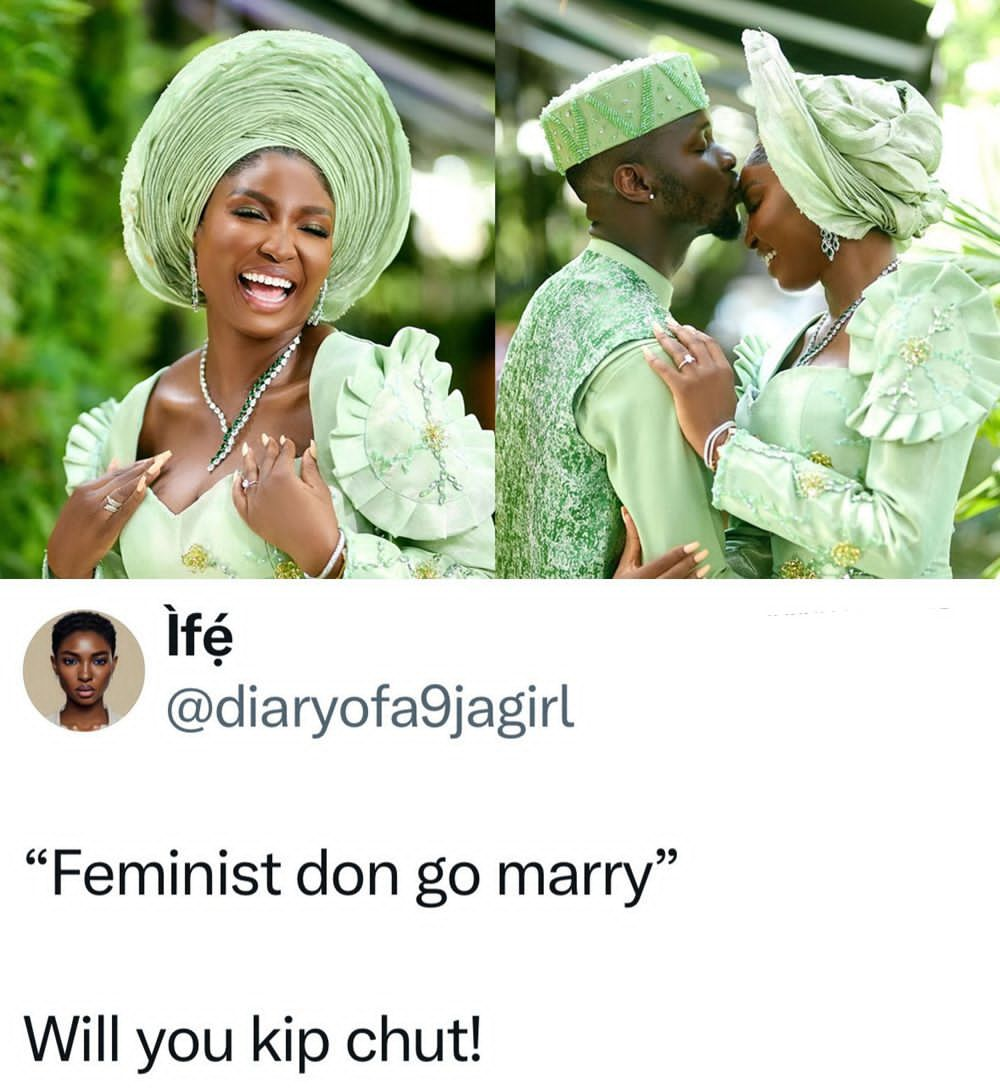
‘Will You Kip Chut!’ – Businesswoman Ife DANG Fires Back at Critics Over Her Marriage Despite Being a Feminist

Popular Nigerian businesswoman and feminist voice, Ife DANG, has clapped back at critics questioning her decision to get married despite being a vocal advocate for women's rights. In a tweet that quickly went viral, the entrepreneur, known for her empowering takes and unapologetic presence online, responded to the murmurs with the sharp and humorous retort: "Feminist don go marry. Will you kip chut!" The internet, as expected, erupted in laughter, applause, and a fresh round of heated debate about feminism, marriage, and societal expectations.
For those familiar with Ife DANG, born Ifẹoluwa, her confident stance comes as no surprise. She has long been a bold figure in Nigeria’s social media space, using her platform, "Diary of a Naija Girl," to discuss issues like gender equality, financial independence, women's empowerment, and the need for societal reforms. Over the years, she has amassed a loyal following who look up to her as a symbol of resilience and success in a country where women still battle deeply ingrained patriarchal norms. But with popularity also comes scrutiny, and Ife has not been exempt.
The noise began shortly after news and pictures of her marriage surfaced online. Rather than celebrating her happiness, some trolls took the opportunity to mock her, twisting her feminist ideals into a weapon against her. Comments like "feminist don go marry" flooded her mentions, suggesting that by choosing marriage, she had somehow betrayed the movement she often spoke so passionately about. In a society where feminism is often misunderstood as being anti-marriage or anti-family, Ife's decision became, to some, an invitation for misplaced judgment.
However, Ife's response was pure gold. In just four words—"Will you kip chut!"—she managed to silence her critics while also highlighting the absurdity of their expectations. Borrowing humor from a popular Nigerian meme phrase, her clapback was not only funny but a perfect example of how to deal with ignorant commentary: not with long-winded explanations but with simple dismissal. And it worked. Her tweet exploded across X (formerly Twitter), gathering thousands of likes, retweets, and supportive comments from fans and fellow feminists who praised her for standing her ground with grace and humor.
Many users pointed out the glaring irony: the same people who often accuse feminists of being bitter, lonely, and "unmarriageable" were now upset that a feminist found love and chose to marry. Others emphasized that feminism has never been about rejecting marriage but about demanding equality, respect, and choice—whether that choice leads to marriage, career pursuits, or both. Ife, by choosing a partner on her own terms, was practicing exactly what she preached.
In the days that followed, Ife’s post sparked broader conversations across Nigerian social media. Discussions ranged from the meaning of feminism in African society to the freedom women should have to define their paths without fear of judgment. Many women shared personal stories of being labeled "fake feminists" because they expressed a desire for love or chose to marry. It became clear that a deep misunderstanding persists about feminism’s true goals: choice, agency, and respect for whatever path a woman decides to take.
Through it all, Ife DANG remained unbothered. Instead of engaging in endless debates, she allowed her initial response to stand as a complete statement. It was a masterclass in controlling the narrative, refusing to let others box her into their limited understanding of who a feminist should be. Friends, followers, and even celebrities applauded her, with many noting that women should not have to constantly explain or defend their life choices.
Beyond the social media buzz, Ife’s situation exposed a deeper societal issue—the unrealistic and contradictory expectations placed on women, especially women who dare to be vocal. In a culture where marriage is still often seen as a woman’s ultimate achievement, it is ironic that when independent women marry, instead of congratulating them, some sections of society rush to question their principles. It’s a no-win scenario women are too often forced into, and Ife’s experience was just another reminder of the work that remains to be done.
At the heart of the matter is this truth: feminism advocates for the freedom to choose, not the obligation to reject traditional structures like marriage or family. A feminist getting married does not weaken her ideals; it proves that women can demand equality within any institution, including marriage. It is about partnership, mutual respect, and shared values—not submission, sacrifice, or silence. Ife DANG’s marriage does not contradict her feminism; it embodies it.
By living her truth without apology, Ife has once again inspired many young women who look up to her. She reminds them that they are allowed to be complex, to want love and independence, to advocate for change and still embrace tradition if they so choose. In a world that often tries to force women into narrow boxes, Ife’s ability to confidently live outside of those boundaries is nothing short of revolutionary.
As the chatter slowly dies down and the internet moves on to its next trending topic, one thing remains certain: Ife DANG’s legacy as a fearless advocate for women’s right to choose their path remains intact. Whether building her business empire, championing women's voices, or building a marriage based on equality, she continues to set an example that feminism is not about rigid rules—it is about freedom.
And so, to all those who tried to shame her, her message could not be clearer: "Will you kip chut!" There’s no better mic drop.


